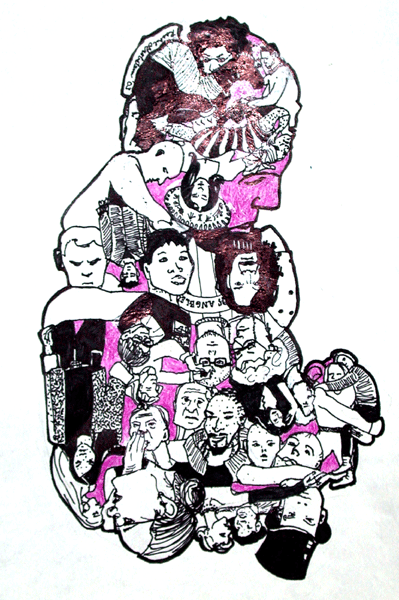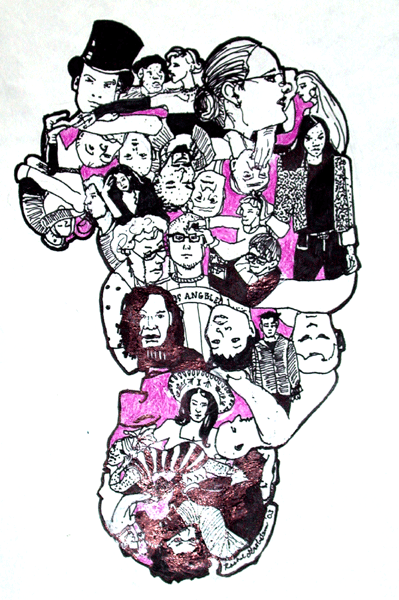Remote Ready Biology Learning Activities has 50 remote-ready activities, which work for either your classroom or remote teaching.
Serendip is an independent site partnering with faculty at multiple colleges and universities around the world. Happy exploring!

| Making Sense of Diversity: | 
|
Kim, Holly, Kyla and Diane began the discussion by describing the "Gender and Psychology" course which they took together last fall, where they got a chance to apply, in the classroom, the theories they were reading about in their assigned texts. Their description of the difficulties of working together, and their ability to resolve them successfully, emphasized the relationships among them which both preceeded the class and grew stronger during the course of the semester. Because Kim had a prior connection with some class members, they were able to say--and she was able to hear--some uncomfortable things about class dynamics, and then work together on improving them. It took both strength and courage for them to be willing to work on their relationships with one another.
Discussion began with expressions of a range of views about the value of single-sex education, but turned fairly quicklly to observations that women are afraid to say controversial things, not primarily because they are afraid of losing friends, but because they are afraid of being wrong. The central concern seemed to be a fear of being thought stupid. It was suggested that this fear may be exacerbated by the custom here of not talking about grades, and being encouraged not to compete openly. Because relative rankings are not public knowledge (as they were in many high schools) every time a woman speaks at Bryn Mawr, she thinks that she is being judged anew in terms of how smart she is. There is a pressure to perform, and a pervasive uncertainty about how well one is performing. (There is also a counter-fear of being seen as a show-off, as over-performing one's intelligence.) Generally, there seems to be a fear of "standing out"--as being distinctive in any way (of being perceived as either "too smart" OR too "stupid"); there is always a fear that "people might talk about you." The primary concern, in other words, seems to be less about over-valuing relationships, and more about the value of the self, particularly of the self's intelligence.
Discussion turned to the ways in which women speak; mention was made of Jenny Boylan's visit to campus in October. She said that when she made the transition from male to female, she found herself also making the transition from irritation at the questions in women's speaking, to enacting that sort of uncertainty herself. Mention was also made of the recent visit to campus of Barbara Tannenbaum, who has paid attention to ways women speak in public: their sentences tend to "go up" at the end. The virtues of asking questions (they invite collaboration and extension, rather than the dismissal of alternative viewpoints that a declaration implies) were also reviewed. Certainty intimidates, makes us feel threatened.
Everyone who spoke seemed invested in protecting academic integity, and thought that we should try for honest conversations. It was suggested that the phenomenon we'd been describing were influenced by race and class as much as by gender, that an upper middle class white woman will insist that others "respect me," while women of color, Jewish women, working class women..."want to hear the truth."
What if the class "isn't about answers," but about generating ever-more questions, in order to "build knowledge together"? Might that reconception operate as an intervention into the fear of not being thought smart enough? How safe can the classroom really be? How safe do we want it to be? Don't we have to be challenged? Knowledge is fluid, and confrontation can be useful. Isn't it our responsibility to put ourselves "out there," to assist in others' education? Do women "want to be included" because they are afraid (again) of distinguishing themselves, of getting to the top of the ladder, and dealing with the power and responsibility of that position? How constant, actually, is the level of anxiety on campus around these issues? Are they really a huge problem? Aren't most classes dynamic and engaging, with considerable give-and-take? The discussion of these questions is invited to continue in the on-line forum on "Making Sense of Diversity."
The conversation will resume in person at noon on Friday, February 11, when Paul Somerville and Arthur Taylor from Dining Services, and Debbie Rubin and Ellie Esmond from the Community Service Office, will lead a discussion about campus diversity from the perspectives of some members of the staff.
| Return to Schedule for Friday Noon Conversations
![]()
| Bryn Mawr Conversations
| Archived
Forum
| Archive of Bryn Mawr Conversation
| General Conversation
| Serendip Home |